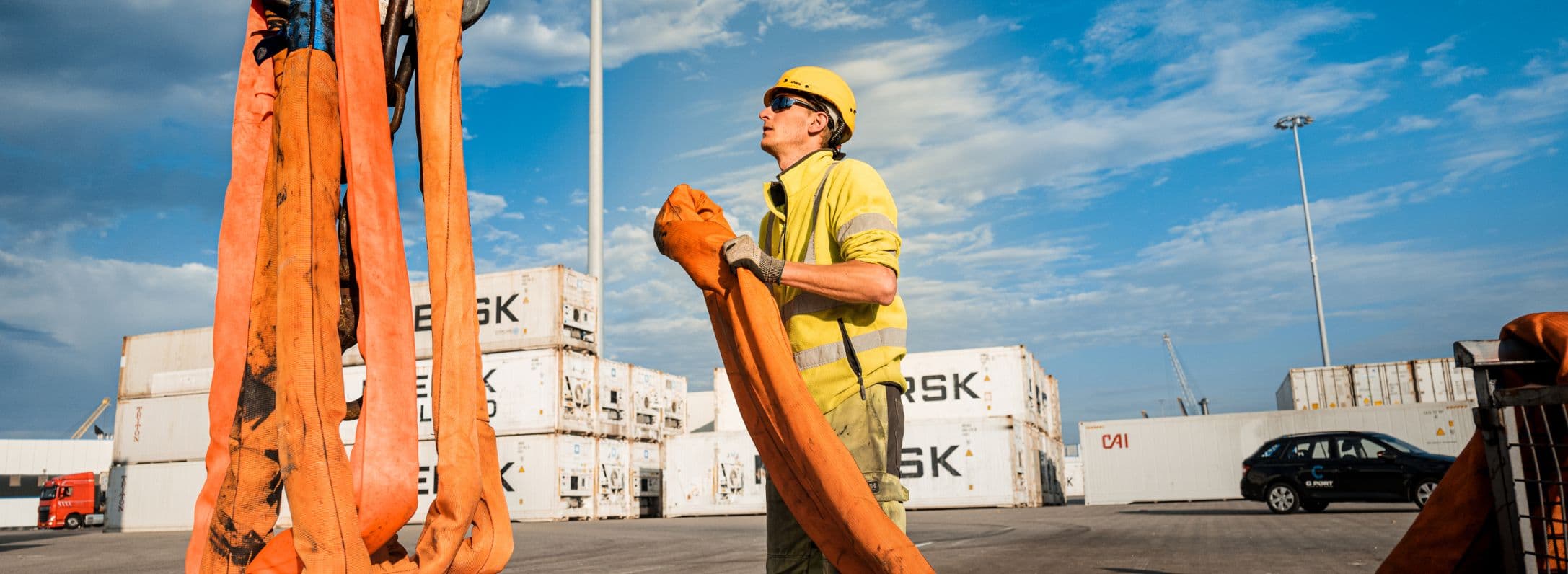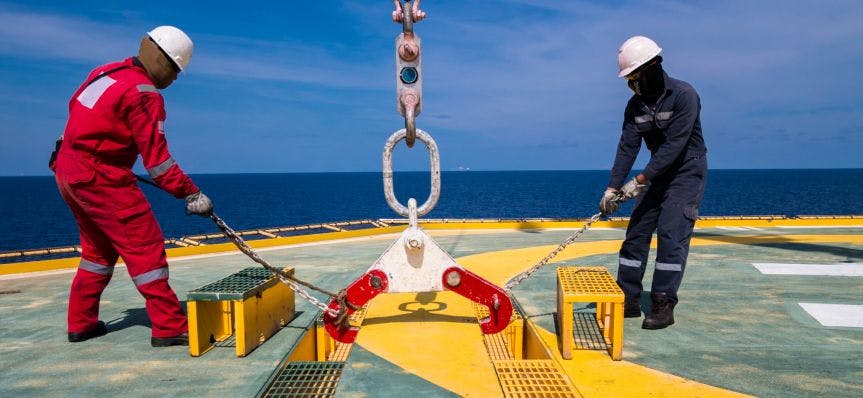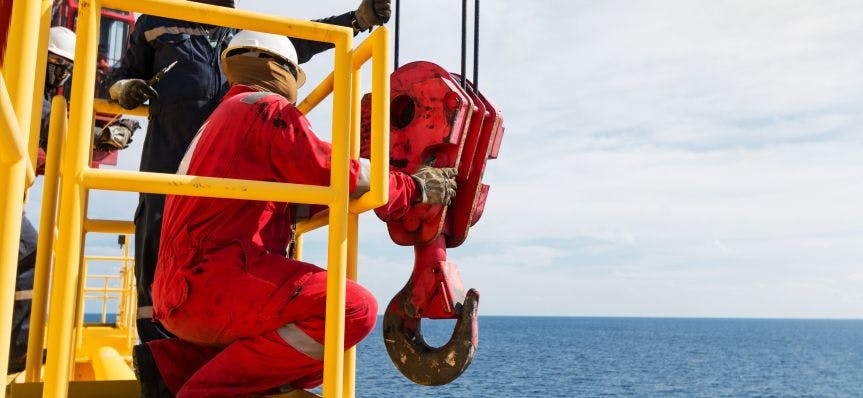Niayesh Sadrzadeh
Content Marketing Manager

Becoming an Offshore Rigger: A Comprehensive Guide
Intrigued by offshore work and the distinct role of a rigger? This guide dives into the role of an offshore rigger, a profession requiring not just physical strength, but an understanding of engineering principles, attention to safety protocols, and a relentless dedication to efficiency. Offshore riggers are the heroes of offshore platforms, managing the movement of large equipment and heavy loads, and ensuring smooth operational flow in challenging conditions. This demanding yet fulfilling career path offers growth opportunities that are not only personally rewarding but also essential to the functioning of some of the world's most important industries, including the oil, gas, and renewable energy sectors.
The Role of an Offshore Rigger
On top of the list of an offshore rigger's responsibilities is the movement of big equipment on an offshore platform or vessel. Operating tools such as hoists, pulleys, and cranes ensure that heavy materials are transferred safely and efficiently from one point to another. But the job requires more than muscle. It calls for a fine understanding of weights, balance, and safe handling procedures, informed by principles of physics and engineering.
They load and unload supplies, making sure that every piece of equipment is accounted for, securely fastened, and correctly positioned. Routine maintenance checks on lifting devices are also part of their responsibility, as is the readiness to respond promptly and effectively to any safety incidents.
As riggers gather experience and prove their skill and reliability, they can climb the hierarchy of offshore roles. Progression can lead from the entry-level role of a Roustabout to the more advanced and leadership-oriented position of a Rigging Supervisor, overseeing the work of a team and ensuring all rigging operations comply with safety and efficiency standards.
Register for free and find your rigger job
Register now!Key Skills for an Offshore Rigger
Being an offshore rigger needs a diverse skill set, which can be categorized into hard skills (technical proficiencies directly relevant to the job) and soft skills (interpersonal skills and personal attributes). Here are the key hard and soft skills that are crucial for an offshore rigger:
Hard Skills
Physical Stamina: Rigging requires physical strength to handle heavy lifting and stamina to endure long hours in challenging offshore conditions.
Technical Proficiency with Hoisting Technology: A rigger must understand how to operate and maintain lifting devices such as hoists, pulleys, and cranes.
Safety Consciousness: Given the risks of rigging operations, riggers must be experts at identifying potential hazards and implementing safety measures to prevent accidents.
Problem-Solving Abilities: Rigging operations are often with complex challenges. Rigging professionals must be proficient at assessing these situations and developing effective solutions.
Soft Skills
Effective Communication: Rigging is teamwork. Good communication skills are critical for coordinating with team members, responding to instructions, and promptly reporting incidents or issues.
Strength: Offshore rigging is a demanding job that requires physical and mental resilience. Being able to cope with pressure, endure challenging situations, and bounce back from setbacks is crucial.
Adaptability: The offshore environment can be unpredictable. Rigging professionals must be adaptable, and ready to adjust to changing conditions or unexpected situations.
Leadership: For those aspiring to advance to roles like Rigging Supervisor, leadership skills are essential. These include the ability to guide a team, oversee operations, and ensure compliance with safety and efficiency standards.

Qualifications and Certifications for Offshore Riggers
Entering the offshore rigging field requires a certain level of formal education, on-the-job training, and various certifications to ensure that the individual is equipped with the necessary knowledge and skills. Here are some essential qualifications and certifications for an offshore rigger:
Formal Education
High School Diploma: A high school diploma is the basic minimum educational requirement for offshore riggers. It is the basis on which additional training and education are built.
Vocational Training
On-the-job Training: Many riggers learn their skills through on-the-job training, gradually building their expertise while working alongside experienced professionals.
Vocational Schools: Some prospective riggers opt to attend vocational schools, where they learn the basics of rigging operations in a more formal, structured environment.
Certifications
Rigging Certification: Rigging certification programs, such as those offered by the National Commission for the Certification of Crane Operators (NCCCO), provide riggers with the technical knowledge they need to operate safely and efficiently.
Basic Offshore Safety Induction and Emergency Training (BOSIET): This mandatory safety training is essential for all workers in the offshore oil and gas industry. It equips riggers with skills to handle emergencies, survival techniques, and safety procedures specific to offshore installations.
Continuous Training: The industry's technology and regulations are continuously evolving. As such, an ongoing commitment to further education and training is crucial to maintain the latest knowledge and competencies in the field.
By obtaining these qualifications and certifications, offshore rigger prepares themselves for the rigors and challenges of this field. It's a significant investment in their career that can open up many growth opportunities.
Ready for a rigger job? Set up your Crewlinker profile now
Start nowSafety Protocols and Risk Management
Offshore operations always put safety first. Rigging work follows strict safety rules. These rules include regular checks of equipment and sticking to the allowed load limits. It also means using the right gear correctly and always wearing safety equipment like helmets, boots, and gloves. There are also strict risk management practices. This help spots potential dangers before they become problems.

Offshore rigging is a demanding yet fulfilling career, with numerous progression opportunities. As part of a dynamic industry that powers the world, offshore riggers play a crucial role in ensuring safety and efficiency. This comprehensive guide provides an inside look at the life of an offshore rigger, and we hope it has helped you better understand this vital and challenging role. The offshore world may be out of sight, but it is central to our daily lives, and riggers are at its heart.
Whether you are looking for an offshore rigger position or you just graduated and are looking for an entry-level job, Crewlinker has something for you! Do not forget to check out our vacancies!